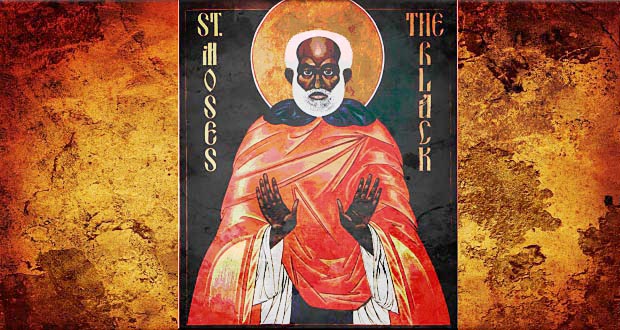A recent Seton graduate informed us that he had chosen Moses for his Confirmation patron.
No, not THAT Moses! There was, in fact, another Moses from the same Egyptian locality who was as colorful a character as the great Patriarch. August 28th could well be termed the feast day for bad boys gone good, since Moses the Ethiopian shares this day with Saint Augustine, another great figure with a somewhat dubious background. In his Confessions, Saint Augustine gives numerous details of his misdeeds, but, frankly, the nefarious doings of Moses make Augustine look like a mildly naughty juvenile!
Moses was a slave in Egypt who was a constant irritant to his master. Moses was violent, intractable, untrainable, argumentative and generally unpleasant to all. After numerous attempts to give Moses to another overseer, his master came to the conclusion that no one wanted anything to do with such an impossible fellow. When Moses was found guilty of theft and suspected of murder, his master simply told him to go away! So began a reign of terror in the Nile Valley.
Reign of Terror
Moses formed a band of ne’er-do-wells who wreaked havoc on the villages of the Nile, robbing, murdering, pillaging and wantonly destroying the property of rich and poor alike. Once, Moses was thwarted in a robbery by a barking dog. He was rather put out by this and came back later to steal some sheep from that household. The owner hid and saw where Moses went after the theft; the owner informed the authorities, who followed and came close to capturing the brigand, but Moses was able to flee and take refuge in a nearby monastery. The monks in charity took Moses in and protected him. In time, Moses found the peace and simplicity of monastic life very attractive. He repented, was baptized, and joined the famous monastic community of Scetis in the Egyptian desert.
Monastic discipline did not come easily to Moses. His impatient nature at times led him close to despair that he would ever overcome his tempestuous nature; finally his fellow monks were able to teach him that Christian perfection was a life-long task. From that time Moses was able to make steady progress in his spiritual development.
Reigning Himself In
Sometimes his past life broke into his new existence, however. Once, four or five robbers broke into his cell. Moses, being an immensely strong man, was able to overcome them all. He tied them up and dragged them to a meeting with the other monks to ask what should be done with them. He thought that it would not be a Christian act to harm them. The robbers were treated mercifully by the monks; they repented and became monks themselves under the tutelage of Moses. Later some twelve members of his former gang came to Moses and also asked to be received as monks.
So, Moses found himself the leader of a group rather different in character than his previous associates! He formed a new monastic foundation some distance away from Scetis, a bit isolated from other monasteries in the region. Moses eventually was ordained a priest to see to the sacramental life of his monks.
Entering the Reign of God
There were still Berber bandits roaming throughout Egypt, and a group of them determined to attack the new monastery. Moses urged the monks to take refuge with their fellows some distance away, but seven of his men stayed with Moses to meet the marauders. The monks offered monastic hospitality, but the pagan Berbers would have none of it and put all eight to the sword.
Moses has been named a patron for non-violent resistance, of course. Since he experienced the non-judgmental attitude of the desert monks, Moses himself championed this virtue. He once said, “If the monk does not think in his heart that he is a sinner, God will not hear him.” A young monk asked him, “What does that mean, to think in his heart that he is a sinner?” Moses replied, “When someone is occupied with his own faults, he does not see those of his neighbor.”
For further reading on the Desert Fathers, there are three inexpensive volumes available: The Sayings of the Desert Fathers, The Wisdom of the Desert Fathers and The Lives of the Desert Fathers. All are widely available.
What is your favorite saint conversion story?Header Image CC jimforest

 Seton Magazine Catholic Homeschool Articles, Advice & Resources
Seton Magazine Catholic Homeschool Articles, Advice & Resources
